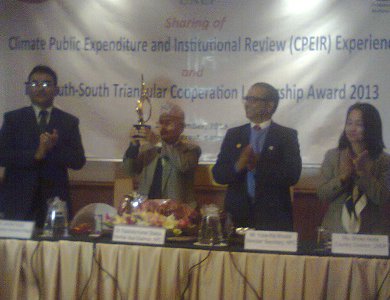
Although Nepal is one of the most vulnerable countries in the world in terms of climate change, Nepal’s current budget allocation has shown that the concerned officials and policymakers are nowhere near grasping it.
The main ministries, which are responsible to implement the annual climate change adaptation program, virtually received no budget at all. Prepared under a Climate Finance Working Group, UNDP and UNEP supported program under National Planning Commission, the recently released Climate Change Budget Code revealed the grim reality of Nepal’s overall scenario.
Although Nepal has been passing through a prolonged political instability, the country has made a certain progress, which has even been heralded as an example for other countries. Introducing Climate Change Budget coding, Nepal has proven that it has the capability to use innovative methods.
The first evaluation of the application of this climate budget code is encouraging. Out of 27 ministries, eleven ministries have already allocated more budgets toward climate change activities. Overall, about 10 percent of the national budget is dedicated to the climate change activities.
For this, National Planning Commission and Ministry of Federal Affairs and Local Affairs received Climate Public Expenditure and Institutional Review (CPIER) and Global South-South Development (GSSD) Leadership Award 2013 for Nepal’s exemplary leadership and innovative work on the Climate Public Expenditure and Institutional Review.
“As Nepal is highly vulnerable to climate change impacts, the country needs to increase its budget in adaptation in climate change related activities. In the absence of coordination among various ministries, it is impossible to meet the challenges posed by climate change,” said vice chairperson of National Planning commission Dr. Rabindra Shakya. “It is a matter of pride for all Nepalese to have this international recognition.”
As Nepal made the progress in budget coding, there was no challenger. Joint secretary of National Planning Commission Gopi Mainali received the award on behalf of National Planning Commission and Ministry of Federal Affairs and Local Affairs.
“Although it was not an easy task to code the budget allocated to different ministries on climate title, we were able to make it through the support from Ministry of Finance,” said Joint secretary Gopi Mainali. “I was privileged to receive the international award on behalf of Nepal government.”
Various questions were being raised regarding the investment of climate budget in Nepal. According to Nepal’s climate change policy, over 80 percent of the climate change budget needs to be allocated to the local level, where it is needed the most.
“The publication of the results of the first review of the application of the budget code is a great achievement,” said Yuba Raj Bhushal, member secretary of National Planning Commission. “After using this modality, we are able to tack down where the budget allocated to climate change is now,” he added.
“As the project has started to track the budget allocated to climate change since 2011, we are now in a position to say what amount of budget is allocated under the title in related ministries,” said Joint secretary and coordinator Climate Finance Working Group at National Planning Commission.
As public finances are channeled through various ministries and departments that are different in their mandate, scope and area of expertise, it is very difficult to locate how much money each ministry and department spends in the area of climate change.
Here the modalities developed by the National Planning Commission’s Climate Finance Working Group come handy. Although the climate budget code was introduced in the annual budget of 2011/12, tracking the budget was impossible as the budget was announced in three installments through ordinances. This was the reason the climate budget code was not officially endorsed in the budget.
As the current government presented the full budget, the budget code is integral part of the budget of fiscal year 2013/014. According to the study, the total climate change budget allocated for the fiscal year 2013/014 is Nepalese rupees 53,482,516,000 or equivalent to 10.3 percent of total budget and 3.1 percent of total GDP. Compared to last year, the budget was much higher. According to reports, the total 8.88 percent of the total budget and 2.7 percent of the GDP were allocated in the fiscal year 2012/013. Out of total budget distributed among 11 ministries, Urban Development has occupied the highest with 21.53 percent followed by Ministry of Agriculture, 20.85 percent.
Similarly, Ministry of Irrigation and Ministry of Finance secured 18.07 and 14.07 percent respectively. The Ministry of Science and Technology and Environment is the fifth in order with a share of about 9 percent. According to the study, these five ministries take over 85 percent of the budget allocated to climate change. Ministry of Forest and Soil Conservation received 7.44 percent.
Although Ministry of Federal Affairs and Local Development has been made the focal ministry to implement Local Adaptation Plan of Action (LAPA), it received merely 4.04 percent of the budget in fiscal year 2013/014. Ministry of Energy secured merely 1.72 percent and Ministry of Education 0.28 percent
- TANAHU HYDROPOWER PROEJCT: A Significant Achievement
- Apr 15, 2024
- AMBASSADOR HANAN GODAR: Sharing Pain With A Nepali Family
- Mar 30, 2024
- VISIT OF KfW AND EIB TO NEPAL : Mission Matters
- Mar 25, 2024
- NEPAL BRITAIN SOCIETY: Pratima Pande's Leadership
- Mar 24, 2024
- NEPAL ARMY DAY: Time To Recall Glory
- Mar 15, 2024
















